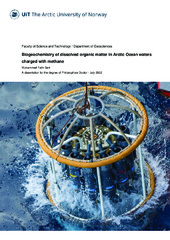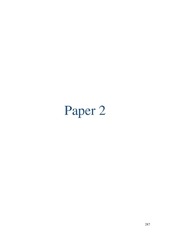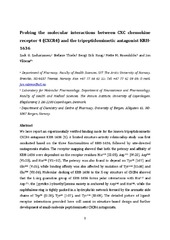| dc.contributor.advisor | Silyakova, Anna | |
| dc.contributor.author | Sert, Muhammed Fatih | |
| dc.date.accessioned | 2022-11-08T12:36:56Z | |
| dc.date.available | 2022-11-08T12:36:56Z | |
| dc.date.issued | 2022-11-25 | |
| dc.description.abstract | Dissolved organic matter (DOM) is defined as organic matter that is smaller than a nominal pore size filter (e.g., 0.7 µm) that passes through during the filtration of aquatic samples. It comprises the largest reservoir of reduced carbon (700 Pg C) in the oceans. The DOM pool is in close interaction with all the elemental cycles and food chains in the ocean and is an essential component in the marine microbial loop.
Methane is seeping from numerous geological sources in the Arctic Ocean associated with multiple mechanisms that elevate methane production and release. Independent of the mechanism, however, liberated methane is predominantly consumed in the water column by methanotrophic bacteria (MOB), which use methane as a source of carbon and energy during an aerobic enzymatic reaction called methane oxidation (MOx). In sedimentary fluid flow systems such as cold seeps or hydrothermal vents, the amount of methane release and subsequent MOx would be substantial and further trigger other ecosystem processes such as bacterial growth and heterotrophic consumption and consequent mechanisms that alter DOM composition in the water column.
Since methane is one of the most potent greenhouse gasses in the atmosphere and due to its subsequent effect on global warming, it has been quantified extensively in the oceanic environments and its fate in the water column has been investigated in different types of geological settings. However, the effects of methane emanation and methane-driven processes on DOM dynamics in the water column have been merely constrained. The main objective of this thesis was to unravel the modifications of DOM composition in relation to methane release in the Arctic Ocean cold seeps and hydrothermal vents. | en_US |
| dc.description.doctoraltype | ph.d. | en_US |
| dc.description.popularabstract | Dissolved organic matter (DOM) is the largest reservoir of organic carbon in the oceans. DOM is in close interaction with all the elemental cycles and food chains in the ocean and is an essential component in the marine microbial cycle.
Methane is seeping from many geological sources in the Arctic Ocean and is mainly consumed in the water column by a type of bacteria, which use methane as a source of carbon and energy during a reaction called methane oxidation. In cold seeps or hydrothermal vents, the amount of methane release and subsequent oxidation would be substantial and further trigger ecosystem processes such as bacterial growth and mechanisms that change DOM composition in the ocean.
As an important greenhouse gas, methane is quantified in oceans. However, the effect of methane release on DOM has been merely addressed. The main objective of this thesis was to determine the modifications of DOM in relation to methane release in the Arctic Ocean cold seeps and hydrothermal vents. | en_US |
| dc.description.sponsorship | This study is funded by the Research Council of Norway through CAGE (Centre for Gas Hydrate, Environment and Climate) project number 223259 | en_US |
| dc.identifier.isbn | 978-82-8236-495-9 | |
| dc.identifier.uri | https://hdl.handle.net/10037/27296 | |
| dc.language.iso | eng | en_US |
| dc.publisher | UiT Norges arktiske universitet | en_US |
| dc.publisher | UiT The Arctic University of Norway | en_US |
| dc.relation.haspart | <p>Paper I: Sert, M.F., D’Andrilli, J., Gründger, F., Niemann, H., Granskog, M.A., Pavlov, A.K., Ferré, B. & Silyakova, A. (2020). Compositional Differences in Dissolved Organic Matter Between Arctic Cold Seeps Versus Non-Seep Sites at the Svalbard Continental Margin and the Barents Sea. <i>Frontiers in Earth Sciences, 8</i>, 552731. Also available in Munin at <a href=https://hdl.handle.net/10037/20176>https://hdl.handle.net/10037/20176</a>.
<p>Paper II: Sert, M.F., Niemann, H., Reeves, E.P., Granskog, M.A., Hand, K.P., Kekäläinen, T., … Gründger, F. (2022). Composition of dissolved organic matter in the ice-covered water column above hydrothermal vents at the Aurora Seamount, Gakkel Ridge, Arctic Ocean. <i>Biogeosciences, 19</i>, 2101–2120. Also available in Munin at <a href=https://hdl.handle.net/10037/24913>https://hdl.handle.net/10037/24913</a>..
<p>Paper III: Sert, M.F., de Groot, T., Kekäläinen, T., Jänis, J., Gründger, F., Niemann, H. & Silyakova, A. Elevated methane alters dissolved organic matter composition in the Arctic Ocean cold seeps. (Manuscript). | en_US |
| dc.relation.isbasedon | <p>Paper I: Sert, M.F., D'Andrilli, J., Gründger, F., Niemann, H., Granskog, M.A., Pavlov, A.K., Ferré, B. & Silyakova, A. (2020). Replication Data for: Arctic cold seeps alter dissolved organic matter composition at the Svalbard continental margin and the Barents Sea. DataverseNO, V1. <a href=https://doi.org/10.18710/JHB371>https://doi.org/10.18710/JHB371</a>.
<p>Paper II: Sert, M.F., Reeves, E.P., Hand, K.P. & Ferré, B. (2022). Replication data for: Compositions of dissolved organic matter in the ice-covered waters above the Aurora hydrothermal vent system, Gakkel Ridge, Arctic Ocean. DataverseNO, V1. <a href=https://doi.org/10.18710/QPGDFW>https://doi.org/10.18710/QPGDFW</a>.
<p>Paper III: Sert, M.F. (2022). Replication Data for: Elevated methane alters dissolved organic matter composition in the Arctic Ocean cold seeps. Github. <a href=https://github.com/fatihserta/Incubation_2022.git>https://github.com/fatihserta/Incubation_2022.git</a>. | en_US |
| dc.rights.accessRights | openAccess | en_US |
| dc.rights.holder | Copyright 2022 The Author(s) | |
| dc.rights.uri | https://creativecommons.org/licenses/by-nc-sa/4.0 | en_US |
| dc.rights | Attribution-NonCommercial-ShareAlike 4.0 International (CC BY-NC-SA 4.0) | en_US |
| dc.subject | VDP::Mathematics and natural science: 400::Geosciences: 450::Oceanography: 452 | en_US |
| dc.subject | VDP::Matematikk og Naturvitenskap: 400::Geofag: 450::Oseanografi: 452 | en_US |
| dc.subject | VDP::Mathematics and natural science: 400::Chemistry: 440::Environmental chemistry, natural environmental chemistry: 446 | en_US |
| dc.subject | VDP::Matematikk og Naturvitenskap: 400::Kjemi: 440::Miljøkjemi, naturmiljøkjemi: 446 | en_US |
| dc.subject | VDP::Mathematics and natural science: 400::Chemistry: 440::Analytical chemistry: 445 | en_US |
| dc.subject | VDP::Matematikk og Naturvitenskap: 400::Kjemi: 440::Analytisk kjemi: 445 | en_US |
| dc.title | Biogeochemistry of dissolved organic matter in Arctic Ocean waters charged with methane | en_US |
| dc.type | Doctoral thesis | en_US |
| dc.type | Doktorgradsavhandling | en_US |


 English
English norsk
norsk




